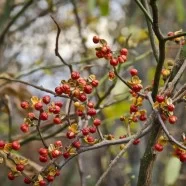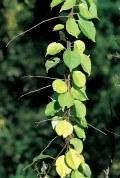A Pervasive Invasive
Asiatic bittersweet is an aggressive invasive species that has made its way to Lewiston and Auburn, the northernmost part of its span. Invasive species are non-native organisms that are introduced to an area, become overpopulated, and cause harm to the surrounding ecosystem. Our own food systems can especially be impacted by the spread of invasive species, such as bittersweet.
Bittersweet was introduced in the U.S. during the 1800s as an ornamental, and it has since been spreading all along the Northeast. The vine has now invaded many parts of the Lewiston Auburn area, where it is causing severe damage. Bittersweet strangles trees and covers the bushes that grow near it; it spreads tree diseases to native tree species; and it even increases tick populations.
Two Bates seniors, Linnéa Selendy and Gabrielle Brewer, worked on a project last semester to help combat invasive bittersweet in Lewiston and Auburn. As part of their Environmental Studies capstone course, and in collaboration with the Community Forest Board, Linnéa and Gabrielle assessed five neighborhoods in L-A, mapping areas where bittersweet was found. Their work revealed that Asiatic bittersweet is prominent in both cities, with seventy-six distinct areas identified thus far.
Given the pervasiveness of the invasive, Linnéa and Gabrielle reached out to the local newspaper in hopes of increasing awareness about how to identify and remove bittersweet. They knew that its eradication would require an education campaign so that residents from across the community could help stop the spread of the species. As they noted, Asiatic bittersweet can be identified by its viny structure, often wrapping around trees and shrubs, with light green ovate leaves. Some plants will have small yellow or red berries on them as well.
In collaboration with community partners Steve Murch and Dave Griswold, Linnéa and Gabrielle are also helping to organize a community-based workshop to equip local residents to identify and remove Bittersweet when they encounter it. The workshop will take place in the spring and will be open to all.

